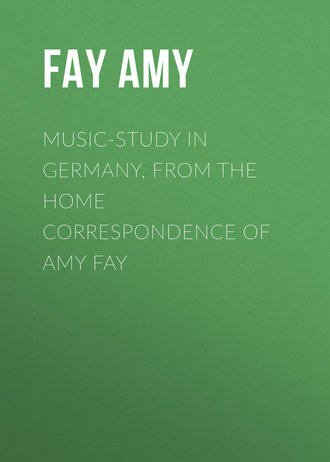 полная версия
полная версияПолная версия
Music-Study in Germany, from the Home Correspondence of Amy Fay
I translate for you the criticism from the Frankfurter Zeitung und Allgemeiner Anzeiger for May 11. Herr Oertling sent it to me yesterday:
"The Philharmonic concert which took place last Friday evening, must be considered as an excellent recommendation of the active members of that association to the public. For not only did the playing of the pianist, Fräulein Amy Fay, give great pleasure to all those who love and understand music, but there was also no fault to be found with the interpretations of the orchestra. * * * With regard to the performance of Fräulein Fay, we were equally charmed by her clear and certain touch and by her conception of the various solo pieces she played. The concert opened with the Sonata in E flat major for violin and piano by Beethoven. The whole effect of the work was a very sympathetic and satisfactory one, and showed a thoughtful interpretation on the part of the artist. The beauty of her conception was especially evident in the Raff "Capriccio," and in Hiller's "Zur Guitarre," given as an encore upon her recall by the audience, and we can but congratulate the teacher of the young lady, Herr Ludwig Deppe, of Berlin, upon such a scholar."
—[Two weeks after the concert, the relative to whom most of the foregoing letters were written, joined the writer at Berlin, and the correspondence came to an end. In the following September, after an absence of six years, my sister returned home. – My sister hopes that no American girl who reads this book will be influenced by it rashly to attempt what she herself undertook, viz.: to be trained in Europe from an amateur into an artist. Its pages have afforded glimpses, only, of the trials and difficulties with which a girl may meet when studying art alone in a foreign land, but they should not therefore be underrated. Piano teaching has developed immensely in America since the date of the first of the foregoing letters, and not only such celebrities as Dr. William Mason, Mr. Wm. H. Sherwood, and Mrs. Rivé King, but various other brilliant or exquisite pianists in this country are as able to train pupils for the technical demands of the concert-room as any masters that are to be found abroad. American teachers best understand the American temperament, and therefore are by far the best for American pupils until they have got beyond the pupil stage. – Not manual skill, but musical insight and conception, wider and deeper musical comprehension, and "concert style" are what the young artist should now go to seek in that marvellous and only real home of music – GERMANY.] – ED.
1
This was written before the full development of the Thomas Orchestra. The writer had heard it only in its infancy.
2
Christ is risen out of bonds and death. He promises joy and blessing to all the world, which for this glorifies Him.
3
In Mr. Longfellow's Poems of Places is a translation of Gerok's poem on the subject: —
"Over three hundred were counted that day
Riderless horses who joined in the fray,
Over three hundred saddles, O horrible sight!
Were emptied at once in that terrible fight."
4
This letter, which was published in Dwight's Journal of Music, is the one alluded to on p. 193.
5
Liszt was born in 1811.
6
In German, the fourth and fifth fingers.
7
See p. 220.
8
See p. 294.
9
Now Mrs. Sherwood.
10
The writer's grandmother was the daughter of a leading Hamburg merchant who fled with his family to America when Napoleon entered it.
11
Frau Rappoldi is now a celebrity.



